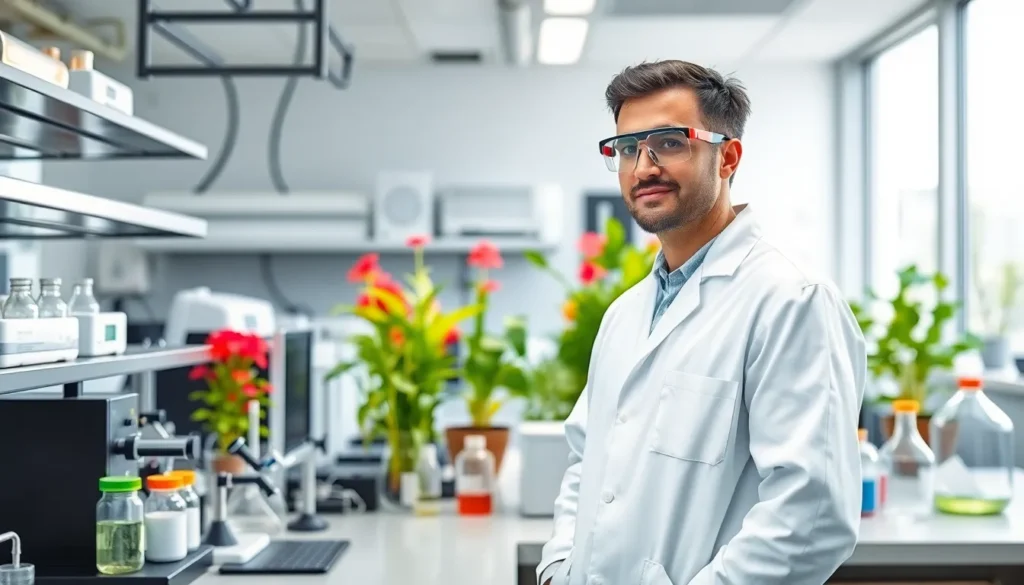Science isn’t just for lab coats and thick glasses anymore. It’s the secret sauce behind everything from your morning coffee to the latest smartphone. Whether it’s uncovering the mysteries of the universe or figuring out why your plants keep dying, science is the unsung hero of daily life.
Science Featured
Science plays a crucial role in shaping the world through its diverse applications. Various disciplines within science contribute to advancements in technology, health, and environmental sustainability. Biology, chemistry, and physics work together to enhance everyday experiences, making tasks easier and solving complex issues.
Innovations in scientific research lead to improvements in healthcare, such as new treatments and medications. Medical breakthroughs result from extensive studies, enabling healthcare professionals to provide better care. Examples include vaccines that prevent diseases and therapies for chronic conditions.
Furthermore, scientific principles drive technological advancements that transform communication and entertainment. Smartphones and computers rely on physics and engineering to function effectively. Breakthroughs in artificial intelligence and machine learning illustrate the power of science in shaping modern society.
Additionally, environmental science informs strategies for addressing climate change and promoting sustainability. Research about renewable energy sources highlights the importance of transitioning away from fossil fuels. Solutions like solar panels and wind turbines rely on scientific knowledge to reduce carbon footprints.
Science also encourages critical thinking and problem-solving skills, which are essential in everyday life. Analyzing data and trends leads to informed decision-making in personal and professional contexts. Understanding scientific principles fosters curiosity and promotes lifelong learning.
Through its applications, science continues to provide solutions that enhance quality of life. By integrating scientific knowledge with daily activities, individuals can make better choices, improve health outcomes, and contribute to a sustainable future.
Key Themes in Science Featured

Science permeates everyday life, influencing numerous fields and leading to groundbreaking advancements.
Innovation and Discovery
Innovations define scientific progress. Emerging technologies in fields like biotechnology and nanotechnology create avenues for previously unimaginable applications. Research in 2023 has focused on CRISPR techniques, resulting in gene-editing breakthroughs that promise disease eradication. Research institutions are intensifying their efforts on renewable energy sources, aiming to develop more efficient solar cells and wind turbines, thus lessening dependence on fossil fuels. Notably, artificial intelligence is evolving rapidly, enabling scientists to analyze vast data sets quickly and discover patterns that inform clinical practices. These discoveries not only foster innovation but also pave the way for future explorations.
Impact on Society
Science significantly shapes societal norms and advancements. Health care systems benefit greatly from new treatments and vaccines developed through rigorous scientific research, leading to improved life expectancy. The integration of technology in education, such as interactive learning tools, enhances student engagement and facilitates deeper understanding. Researchers are addressing pressing environmental issues, advocating for sustainability practices to combat climate change. Public policy increasingly relies on scientific data to address challenges in healthcare, safety, and education. Thus, the influence of science on society contributes to an informed citizenry prepared to face contemporary challenges.
Notable Examples of Science Featured
Science continually shapes society through notable advancements. Breakthroughs in various fields demonstrate the transformative power of research.
Breakthrough Research
Innovations often define the landscape of science. Recent discoveries in biotechnology reveal CRISPR techniques allowing precise gene editing. This advancement holds potential for disease eradication. Renewable energy research also illustrates progress. Studies on solar cells and wind turbines aim to enhance efficiency and accessibility. In health sciences, mRNA vaccine development drastically increased pandemic response times. This research not only protects global health but showcases rapid scientific adaptation. Various laboratories strive for further advancements, fostering hope for innovative solutions to pressing challenges.
Influential Scientists
Individual contributions significantly impact scientific fields. Prominent figures like Jennifer Doudna and Emmanuelle Charpentier are recognized for their work in gene editing, particularly CRISPR. Their collaboration transformed genetic research and opened pathways for new treatments. In environmental science, scientists such as Michael Mann advocate for climate action using data-driven insights. Contributions from these experts encourage informed public discourse. Each scientist’s dedication drives progress across disciplines. Their work inspires young researchers to pursue their interests, ensuring continued innovation in science.
Challenges in Science Featured
Scientific research faces various challenges that impact its development. Funding limitations frequently hinder the progress of innovative projects. Researchers often struggle to secure adequate resources, affecting the scope and duration of studies.
Ethical dilemmas arise when conducting experiments, particularly in fields such as biotechnology and artificial intelligence. Balancing scientific exploration and ethical guidelines fosters debates on the implications of certain technologies. Addressing these dilemmas requires ongoing dialogue among scientists, ethicists, and policymakers.
Communicating complex scientific concepts poses another significant challenge. Public understanding of scientific principles greatly influences support for research initiatives. Scientists must simplify their findings for effective outreach, ensuring non-experts can grasp essential information.
Additionally, interdisciplinary collaboration remains crucial yet difficult. Bridging gaps between diverse scientific fields leads to groundbreaking innovations, but differing terminologies and methodologies can complicate teamwork. Promoting collaboration among biologists, chemists, and engineers enhances problem-solving capabilities.
Resistance to scientific knowledge also affects progress. Skepticism surrounding climate change and vaccination undermines public trust in science. Proactive engagement and education strategies are essential for countering misinformation and fostering a well-informed society.
Navigating regulatory frameworks presents further hurdles. Compliance with guidelines often slows research, particularly in pharmaceuticals and environmental studies. Government agencies must streamline processes while maintaining safety and efficacy standards.
Lastly, adapting to rapid technological advancements generates pressure. Staying abreast of evolving tools and techniques demands continuous learning and flexibility. Researchers play a pivotal role in embracing innovation while ensuring that science remains relevant and impactful.
Future Trends in Science Featured
Scientific research continues to evolve, bringing forth transformative trends reshaping various fields. Emerging trends indicate a strong focus on artificial intelligence applications, enhancing efficiency across disciplines. Machine learning algorithms increasingly analyze vast datasets, leading to breakthroughs in predictive modeling and personalized medicine.
Biotechnology advancements showcase the potential of CRISPR techniques for gene editing, revolutionizing approaches to genetic disorders. Renewable energy innovations increasingly prioritize sustainability, with research on solar and wind technologies aiming to minimize environmental impact. These developments align with global initiatives to combat climate change.
Healthcare advancements also indicate a shift toward telemedicine, increasing access to medical services for underserved populations. Recent data supports the effectiveness of remote consultations, driving the popularity of these services. Digital health technologies, including wearable devices, empower individuals to monitor their health with real-time data.
Furthermore, interdisciplinary collaboration garners more attention, facilitating innovative solutions. Scientists from diverse backgrounds unite to address complex challenges, enhancing the overall research environment. New funding models also emerge, supporting projects that align with societal needs and ethical considerations.
Public engagement remains crucial, with efforts concentrated on improving scientific literacy. Increasing communication around scientific concepts helps demystify complex topics, fostering public trust. Initiatives emphasize the importance of accurate information to counter misinformation.
Ultimately, these trends reflect science’s dynamic nature and its potential to address pressing global issues. Future scientific endeavors are expected to prioritize collaboration, sustainability, and accessibility, ensuring that advancements continue to improve lives and the planet.
Conclusion
The impact of science on everyday life is undeniable. From technological advancements to breakthroughs in health and environmental sustainability, it shapes the world in profound ways. As society faces pressing challenges like climate change and public health crises, scientific innovation offers pathways to solutions.
Future trends indicate a continued emphasis on interdisciplinary collaboration and the integration of advanced technologies. Engaging the public and enhancing scientific literacy will be essential in fostering trust and combating misinformation.
With ongoing research and development, science remains a powerful tool for improving lives and addressing global issues. The journey ahead promises exciting possibilities that will redefine our understanding and interaction with the world.

